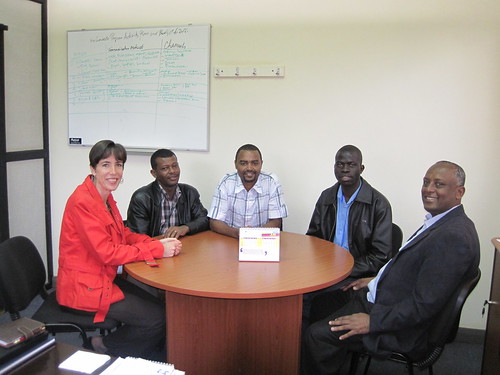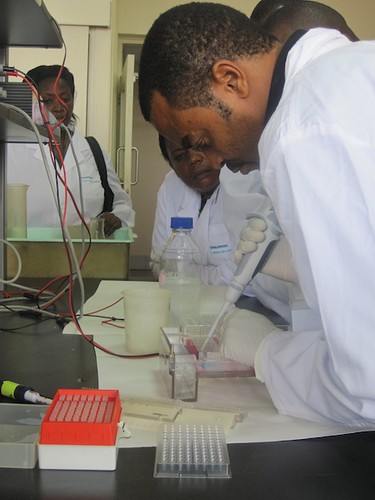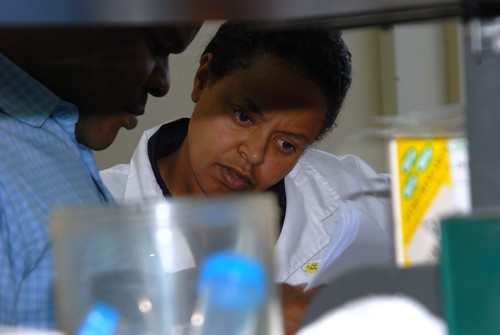| Getting your Trinity Audio player ready... |
For eastern Africa countries to transform into bio-economies, it would require collaborative capacity building efforts to create a critical mass of scientists in the field of biosciences.
However, for these capacity building initiatives to be effective, they must be linked to the development of particular innovations addressing specific problems. This ensures impact and relevance of the capacity building programs to institutions and the region in general.

From left is Santie Devilliers from ICRISAT-Nairobi with the three students Dagnachew
Lule (Ethiopian), Ismail Mohamed (Tanzanian) and Isaac Dramadri (Ugandan) with
Seyoum Leta, Bio-Innovate Program Manager discussing the progress of their training at
BecA-Hub (photo credit: ILRI/Albert Mwangi)
Bio-Innovate has adopted this concept in conducting its capacity building activities. The Program is supporting both MSc and PhD students whose outputs are directly linked to specific project activities. Scientists are sent out for short-term attachments to specialized laboratories outside their countries to acquire specific skills required in delivering particular project components.
This ensures that the scientist acquire skills but at the same time generates data that contributes to the development of innovations and execution of a project. It also counters the ever-increasing brain drain, satisfying the skills versus competency gaps, and equipping scientists from developing countries with the requisite skills to provide solutions to the continent’s development challenges.
One such capacity building initiative involves the International Crops Research Institute for the Semi-Arid Tropics (ICRISAT) Nairobi, a partner in project consortium 1 ‘delivering new sorghum and finger millet innovations for food security and improving livelihoods in eastern Africa’. ICRISAT hosted three students from Ethiopia (Dagnachew Lule, PhD student), Tanzania, (Ismail Mohamed, MSc) and Uganda (Isaac Dramadri, MSc) in March-June in 2012. The students received hands on skills on DNA extraction; Polymerase chain reaction (PCR) genotyping using 20 simple sequence repeats (SSR) markers and allele scoring as well as data analysis for sorghum varieties diversity assessment for project 1. The students further authored publications on finger millet genetic diversity for their respective countries.
 The three students also participated in a two-week training course on “the application of molecular markers in crop improvement” from 29 May to 6 June 2012 organized by the CAPACITATE East Africa project and conducted by ICRISAT at the Biosciences eastern and central Africa-International Livestock Research Institute (BecA-ILRI) Hub in Nairobi. The course was a plus for the students for it complemented the experience gained during the three months with extensive theoretical and practical training on all aspects of the application of molecular markers in crop improvement. The students are now sufficiently equipped to use this technology within their own institutions in their home countries as well as support research activities in the region. They were also able to establish strong collaborative ties within the Bio-Innovate project, which should facilitate future regional collaborations, within and beyond the Bio-Innovate projects.
The three students also participated in a two-week training course on “the application of molecular markers in crop improvement” from 29 May to 6 June 2012 organized by the CAPACITATE East Africa project and conducted by ICRISAT at the Biosciences eastern and central Africa-International Livestock Research Institute (BecA-ILRI) Hub in Nairobi. The course was a plus for the students for it complemented the experience gained during the three months with extensive theoretical and practical training on all aspects of the application of molecular markers in crop improvement. The students are now sufficiently equipped to use this technology within their own institutions in their home countries as well as support research activities in the region. They were also able to establish strong collaborative ties within the Bio-Innovate project, which should facilitate future regional collaborations, within and beyond the Bio-Innovate projects.
Santie Devilliers a scientist with ICRISAT-Nairobi and a co-principal investigator in project 1 supervised these students. “Training these regional scientists in ICRISAT’s laboratories, provided them with international standard training in research methodologies an DNA extraction and related technologies. I believe that this type of training that also supported interaction amongst scientists from different countries and institutions lays the foundation for enhanced scientific networking and research capacity for future regional collaborations,” Santie articulated.

Adey Desta (in a white lab coat) a beneficiary of capacity building activities.
(photo credit: ILRI/Albert Mwangi)
Another beneficiary of the capacity building activities within the Program was Adey Desta, a PhD student from Addis Ababa University (AAU-Ethiopia). Adey was at BecA-ILRI Hub from February to May 2012. Her research focused on the use of DNA based techniques in investigating microorganisms useful in the treatment of agro-industrial wastewater at Modjo Tannery under project 5 on ‘integrated process for sustainable agro-process waste treatment and climate change mitigation in eastern Africa’. In her research, she has identified the presence of 31 bacterial phylotypes in the anaerobic and aerobic reactors and the constructed wetland system at the Modo Tannery. These microorganisms have been associated with the removal of organics, nutrients (N and P), sulphide and degradation of aromatic compounds found in the tannery’s wastewater. These findings will help the project design strategies that will harness these microbial communities to optimize and efficiently remove the pollutants in the wastewater before being release into the Modjo River.


